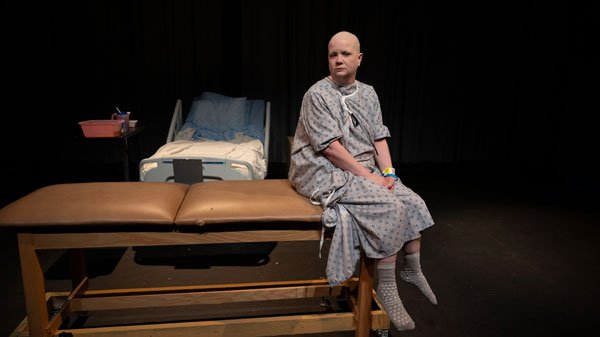A Profound Look at Life, Death, and the Human Condition in “Wit” at Playhouse 22
The intersection of intellect, mortality, and empathy takes center stage in Wit, a powerful drama by Margaret Edson. Directed by Ed Faver, this thought-provoking production runs weekends from April 25 to May 4, 2025 at Playhouse 22 in East Brunswick, New Jersey. As part of the theater’s esteemed “On the Edge” series, the play dives deep into themes of life, death, poetry, and human connection, creating an emotional and intellectual journey that audiences won’t soon forget.

The Story of “Wit”: A Powerful Exploration of Life’s Fragility
At the heart of Wit is Vivian Bearing, a brilliant and seemingly stoic professor of 17th-century metaphysical poetry at an Ivy League university. For decades, Vivian has prided herself on her sharp intellect, her ability to dissect poems by John Donne with precision and rigor, and her commitment to academic excellence. She has lived a life defined by reason, logic, and intellectual pursuits. Yet, as the play unfolds, this intellectual armor is slowly chipped away when Vivian is diagnosed with Stage IV metastatic ovarian cancer, and must undergo an experimental, high-risk chemotherapy treatment.
Vivian, portrayed as a highly competent and often intimidating academic, begins to confront her own mortality in a way that she never had to before. Her journey through the medical system, the harsh realities of her diagnosis, and her internal reckoning with the limits of her knowledge and control form the emotional core of the play. As she navigates the physical and emotional toll of her aggressive treatment, she is forced to reckon with the fragility of life in a way that no lecture or academic paper could ever prepare her for.
A Character Study of Strength, Vulnerability, and Transformation
Vivian Bearing is a character who is at once formidable and deeply human. Despite her academic success and formidable intellect, her life has been somewhat devoid of meaningful personal connections. She has spent much of her life immersed in her work, often at the expense of relationships and emotional vulnerability. As she grapples with the brutal reality of her diagnosis, however, Vivian begins to experience the emotional depth of her situation in ways she never anticipated.
Director Ed Faver brings a nuanced sensitivity to the production, emphasizing the complexity of Vivian’s character as she shifts from a cold, intellectual professor to a woman confronting the inevitability of death. The character’s emotional journey is an evolution that speaks to the universal human experience: the fear, the regrets, the desire for meaning in the face of a finite existence.
The play’s focus on Vivian’s internal and external struggles—against her own intellectual arrogance, the harsh medical world, and her isolation—makes for a deeply affecting narrative that leaves a lasting impact on its audience. As her chemotherapy treatments intensify, so too does her realization that intellectual achievement alone cannot protect her from life’s most fundamental truths.
The Poetry of Life: Using Literature as a Lens for Understanding
In Wit, Edson masterfully integrates poetry as both a thematic and narrative tool. Vivian’s background in the works of John Donne, a poet known for his meditations on death and the afterlife, serves as a poignant parallel to her own experiences. The structure of the play is woven with references to Donne’s poetry, particularly his famous Holy Sonnets, which confront the themes of mortality and the soul’s journey.
Vivian’s exploration of Donne’s words becomes a metaphor for her own journey toward understanding and acceptance. Her intellectual approach to poetry—decoding metaphysical puzzles and dissecting every word—mirrors her need for control over her life and death. But as the play progresses, she finds herself struggling to apply this same intellectual rigor to the most difficult question of all: how does one face the end of life with grace and dignity when every answer seems elusive?
One of the most striking aspects of the play is how Edson uses poetry to bridge the gap between the intellectual and the emotional. In a sense, Donne’s works become a vehicle through which Vivian can attempt to make sense of her illness. Yet, as her condition worsens, she begins to realize that some things—such as the inevitability of death—cannot be neatly packaged into a well-constructed analysis or literary explanation.
Compassion and Human Connection: The Play’s Heart
As the title of the play suggests, Wit isn’t just about intelligence; it’s about the “wit” of human connection—an understanding that transcends academic achievement or intellectual prowess. Vivian’s journey toward compassion is catalyzed by her interactions with the people around her. At first, she approaches her medical treatment with the same cold, clinical detachment that she applies to her scholarly work. However, as she interacts more deeply with the medical team and begins to experience the care—or lack thereof—that she receives, Vivian’s emotional transformation begins.
The relationship between Vivian and Nurse Susie, a medical professional who shows warmth, humor, and empathy, becomes central to the emotional resonance of the play. Nurse Susie offers a kind of compassion that Vivian has not encountered in her academic world. This compassionate interaction ultimately challenges Vivian’s perception of life and death, pushing her toward a more nuanced understanding of what it means to truly live.
The Impact of “Wit” on the Audience
Wit is a play that invites its audience to consider the meaning of life, the nature of suffering, and the importance of human connection. Through Vivian’s journey, we are reminded of the profound importance of compassion in the face of life’s greatest challenges. The play also challenges us to examine how we confront our own mortality and whether we, like Vivian, allow ourselves to open up to vulnerability, tenderness, and care in our most difficult moments.
The themes of humanity, intellectualism, and suffering in Wit are sure to resonate deeply with the audience, prompting reflection long after the final curtain falls. This intimate exploration of the human condition makes Wit not only a compelling drama but also a cathartic experience that speaks to the very heart of what it means to live and die with grace.
A Must-See Performance at Playhouse 22
Set against the backdrop of Playhouse 22’s intimate and immersive theater setting, Wit promises to be an unforgettable experience. With its sharp dialogue, emotional depth, and powerful performances, this production is a must-see for theater lovers, especially those who appreciate works that explore the complexities of life and death through both intellectual and emotional lenses.
Tickets are available now for Wit, running weekends from April 25 to May 4, 2025, as part of Playhouse 22’s “On the Edge” series. Don’t miss your chance to experience this thought-provoking and heart-wrenching drama about life, death, poetry, and the importance of compassion.











